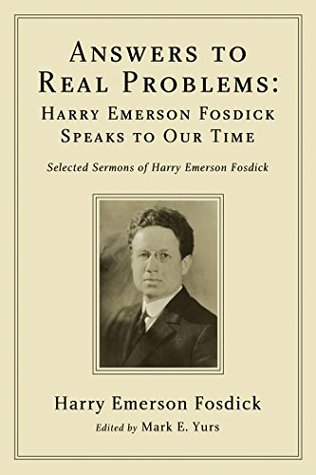- Bible
- Read the Bible
- Bible Versions
- Verse of the Day
- Reading Plans
- Verses by Topic
- Books of the Bible
- Bible Images
- Study
- Commentaries
- Concordances
- Dictionaries
- Encyclopedias
- Sermons
- Bible Atlas & Maps
- BP Wiki
- Devotionals
- Today's Devotionals
- Light of the World
- All Devotionals
- Inspirational Quotes
- More
- Picture Quotes
- Videos
- Inspirational
- Bible Study
- What The Bible Says
- Bible Q&As
- Daily Bread
- Bible by Genre
- Bible Stories
- Random Bible Verse
- Community
- Store
Answers to Real Problems: Harry Emerson Fosdick Speaks to Our Time: Selected Sermons of Harry Emerson Fosdick
by Harry Emerson Fosdick
Harry Emerson Fosdick (1878-1969) was one of the most influential preachers in the twentieth century. He believed every sermon ought ask and answer some question that genuinely troubles individuals or the societies of which they are a part.
Answers to Real ProblemsAnswers to Real Problemsgathers several significant sermons from Fosdick's long ministry. The selection is rooted in current needs. This collection presents him asking and answering questions that still weigh--or ought to weigh--on the minds of people today. Here is one of America's finest preachers talking about war, nationalism, the relationship between liberals and conservatives, the plight of the church, public ethics, private morality, and more.
Mark E. Yurs is Pastor of Salem United Church of Christ in Verona, Wisconsin. He is the author of Being a First Church: What a Pastor's First Congregation Should Know Being a First Church: What a Pastor's First Congregation Should Know (Wipf and Stock, 2003).
Answers to Real ProblemsAnswers to Real Problemsgathers several significant sermons from Fosdick's long ministry. The selection is rooted in current needs. This collection presents him asking and answering questions that still weigh--or ought to weigh--on the minds of people today. Here is one of America's finest preachers talking about war, nationalism, the relationship between liberals and conservatives, the plight of the church, public ethics, private morality, and more.
Mark E. Yurs is Pastor of Salem United Church of Christ in Verona, Wisconsin. He is the author of Being a First Church: What a Pastor's First Congregation Should Know Being a First Church: What a Pastor's First Congregation Should Know (Wipf and Stock, 2003).
BUY NOW
Kindle Edition, 234 pages
Published March 7th 2017 by Wipf & Stock, an Imprint of Wipf and Stock Publishers (first published July 2008)
© 2025 Bibleportal.com All rights reserved.

1878-1969
Harry Emerson Fosdick was an American clergyman. He was born in Buffalo, New York. He graduated from Colgate University in 1900, and Union Theological Seminary in 1904. While attending Colgate University he joined the Delta Upsilon Fraternity. He was ordained a Baptist minister in 1903 at the Madison Avenue Baptist Church at 31st Street. Fosdick was the most prominent liberal Baptist minister of the early 20th Century. Although a Baptist, he was Pastor of the First Presbyterian Church on West Twelfth Street and then at the historic, interdenominational Riverside Church (the congregation moved from the then-named Park Avenue Baptist Church, now the Central Presbyterian Church) in New York City.
Fosdick became a central figure in the conflict between fundamentalist and liberal forces within American Protestantism in the 1920s and 1930s. He saw the history of Christianity as one of development, progress, and gradual change. To the fundamentalists, this was rank apostasy, and the battle lines were drawn.
Fosdick was an outspoken opponent of racism and injustice. Fosdick's sermons won him wide recognition, as did his radio addresses which were nationally broadcast. He authored numerous books, and many of his sermon collections are still in print. He is also the author of the hymn, "God of Grace and God of Glory"
... Show more